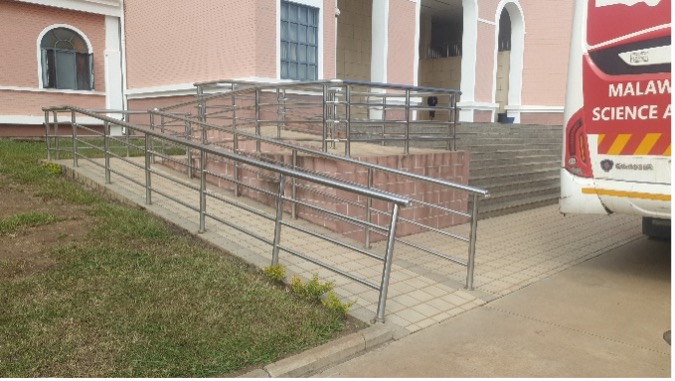Students
Disability Support
The Malawi University of Science and Technology, in collaboration with Michigan State University and other Malawian universities are implementing a project called Transforming Higher Education Systems (THES) to ensure gender equality and social inclusion. Hence MUST offers different forms of support to students with different forms of disability such as mobility. Our commitment to promoting human rights of people with disability is embedded in the Gender and Anti-Sexual Harassment (GASH) policy.
Medical support
Our students are put on the Medical Aid Society of Malawi (MASM) medical scheme. The scheme covers students for all medical conditions.
Access to facilities
Our facilities are disability friendly. These include the hostels, lecture rooms, offices and library. These either have lifts or ramps to allow for wheelchair movement.


Assistive devices
MUST is pioneering the design and fabrication of prostheses and orthoses. Currently, the first phase of curriculum development of Prosthetics and Orthotics (P&O) programme has been completed. Besides, we have other assistive devices for people with temporary or permanent disabilities. The students can also access some assistive devices through the medical scheme.
Financial support
MUST students have an opportunity to apply for public loans from the Higher Education Students’ Loans and Grants Board (HESLGB). HESLGB loans cater for both tuition fees and stipend allowances. Besides MUST has an Endowment Fund for other needy students. Besides, through the THES project, MUST is establishing systems to ensure that minority groups such as students with disabilities, students from extremely poor backgrounds, and other vulnerable groups get financial and other support to complete their studies with ease.
Zero Tolerance on Sexual Exploitation and Abuse
MUST is working with UNICEF and has so far formulated and is now implementing a Policy on Prevention of Sexual Exploitation and Abuse as per UN requirements. The policy has strategies on reporting, investigation and punishment for perpetuators of sexual exploitation and abuse and has also set mechanisms for physical, psychological, financial and medical support for the survivors of sexual abuse and exploitation. Training and awareness creation on stakeholders in sexual exploitation and abuse has also been emphasized in the policy.